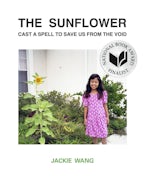"Here dreams are spaces of radical possibility, and as in the real world, the possibilities are sometimes magical and sometimes nightmarish and sometimes both, like dress rehearsals for the apocalypse."—The New York Times
"In this extraordinary debut, Wang (Carceral Capitalism) creates a symbolist dream diary for catastrophic times... The book engages with climate change and the apocalyptic, asking, 'Can a book parry catastrophe?"—Starred review in Publishers Weekly
"Writer Jackie Wang documented her dreams and sculpted them into poems for her debut collection The Sunflower Cast A Spell To Save Us From The Void. The book is a surrealist expression of how social processes and traumas show up in our dreams, and how we can better understand ourselves by tuning into them."—NPR Morning Edition
"The act of writing the dream is itself one of interpretation, but here those interpretations are loose and wild; Wang doesn’t give us a stable blueprint. This book’s revolutionary consciousness is lodged in the act of trying to write and live with something unknowable."—The Nation
"The spell of this book preserves the multiple-layered, multiple-petaled nature of life. Wang’s collection professes the potency of dream and sunflower; it professes the persistence of powers that save."—The Brooklyn Rail
"Wang’s collection takes us to all the unfathomable places we sometimes find ourselves in, and reminds us there is also hope and brightness and bravery."—Electric Lit
"Wang’s debut collection, formally diverse and marked with a sardonic tinge, suggests a porous border between the dream and waking worlds."—The Millions
"Dreams, Wang indicates, offer a radical means of reconfiguring the terrain of the present, working through interior and social responses to calamity, intimating different realities. Wang’s poems reshape the hermetic and confounding work of dreams to reveal these secret capacities, there all along."—Public Books
“'Can a book parry catastrophe?' Jackie Wang (heliomancer, revelator, poet) asks, in a book that not only parries catastrophe, but climbs, through its eye, into its mind, into its fantasy even. From the blistering seat of that overwhelming perspective, Wang begins calling catastrophe back from storming and suffering itself onto others (community, friendships, the future), by counting and recounting, in the most irreproachably neon vocabulary, dreams, translations of dreams, which are, as reclamations of logic and improvements of life, scenarios that together manifest an alternative method of survival: 'the sunflower book: It is code for love.'”—Brandon Shimoda
"Jackie Wang’s new book asks questions that rotate/fluoresce against a backdrop or foreground of ceremonial apprenticeship, like sunflowers or the memories of sunflowers. In this other world, 'survivor trauma' is experienced by creatures and non-creatures alike. I was so moved by the mixtures of writing I encountered here: the “map” of a dream, but also the notebooks that 'fill up,' not always in the English of waking time. 'I want to write you without writing over you. I have something to tell you,' the speaker says, with the delicacy and directness of a sentence written directly on the skin. Kalan Sherrard’s illustrations echo this way of marking the page: a mode of companionship and witness in a book that did not end because it did not begin. Is this what it feels like to be a person?"—Bhanu Kapil
"Jackie Wang’s The Sunflower Cast A Spell To Save Us From The Void is a gorgeous, ambitious, phantasmagoric lament for the better worlds our bodies tell us must be possible, every day, even when we’re numb with pain. It goes deeper into darkness—political darkness, the end of our days—than anything I’ve read in recent poetry. But the poems are also filled with shifting, glittering 'I’s' and 'you’s' that frame themselves for us then break their frames, repeatedly moving between poetry and meditations on “poetry” before becoming beautiful poetry again. I felt myself get lost and found in their address. I hope you will, as well."—Chris Nealon

